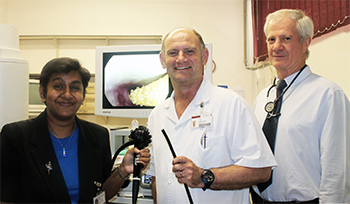Latest News Archive
Please select Category, Year, and then Month to display items
20 December 2021
|
Story Igno van Niekerk
|
Photo Igno van Niekerk
![]() Dr Samantha Potgieter, Senior Lecturer in the Department of Internal Medicine and Dr Nicholas Pearce, Senior Lecturer in the Department of Surgery comment on their team members’ commitment and determination during the pandemic.
Dr Samantha Potgieter, Senior Lecturer in the Department of Internal Medicine and Dr Nicholas Pearce, Senior Lecturer in the Department of Surgery comment on their team members’ commitment and determination during the pandemic.
On the forefront of the battle against the COVID-19 pandemic, two UFS doctors are leading a team of inspired healthcare workers in a superhuman effort to make a positive difference.
With the pandemic in its second year and the recurring challenges of new waves and strains consistently in the news, one would expect the doctors to be tired. However, quite the opposite is true. Upon entering the office where Dr Samantha Potgieter, Senior Lecturer in the Department of Internal Medicine and Dr Nicholas Pearce, Senior Lecturer in the Department of Surgery are in a meeting with colleagues, the debate is vibrant; an energetic sense of mission.
Miraculously succeeded
My brief is to collect stories and experiences they’ve had over the past 18 months at the Tumelo ward for general and high-care patients, where the team has miraculously succeeded in not running out of oxygen or ventilators, despite handling high volumes of patients from the Free State and Northern Cape. “We saw those pictures of piled-up bodies in Italy. We were committed to avoiding that at all costs. And we did.”
Success stories? First mentioned are their team members’ commitment and determination. The team had to stand in when families could not support dying patients. “They did not die alone. Our team was there.”
“Really sad and frustrating are the deaths that could have been prevented. Unvaccinated patients. They arrive ill, wanting to know if they can get it. Too late...” – Dr Nicholas Pearce
Then came hope
Sad stories? The past year has had its share of sad stories. “Someone comes in during the morning, needs oxygen, in the afternoon they are in ICU, then ventilator – and then they die. We’ve never faced anything like this before.”
Then came hope. Vaccines. Dr Pearce is in charge of the vaccination site at Universitas Hospital. “Really sad and frustrating are the deaths that could have been prevented. Unvaccinated patients. They arrive ill, wanting to know if they can get it. Too late ...” He opens his cell phone – shares the stats. “We can handle 2 000 vaccinations a day. At the moment about 250 comes in.” He shakes his head.
“We can beat this virus, but we need to stand together ...”
Gastroenterology Unit works to bring a transformative impact to healthcare
2016-11-21

Dr Rita Nathan, Acting CEO of Universitas Hospital,
Prof Willem Kruger, Acting Head of the
School of Medicine, and Prof Jan van Zyl,
Head of Department of Internal Medicine.
Photo: Nonsindiso Qwabe
The departments of Surgery and Internal Medicine at the University of Free State launched the newly upgraded Gastroenterology Unit of the Universitas Academic Hospital on 8 November 2016. Realising the need to provide state-of-the-art equipment that caters for various health needs, the unit has acquired new pieces of equipment worth R7 million. Through the equipment, a move towards the digital revolution, the unit hopes to bring about a transformative impact on healthcare service delivery in central South Africa and its surrounds.
Upgraded unit will make a difference on burden of diseases
Dr Rita Nathan, Acting CEO of the Universitas Hospital, said the increase in the number of scopes, and the improvement in technology, will facilitate improved service delivery to the community of the Free State and beyond. “This upgrade will enable the unit to make a tremendous dent in the burden of diseases in the communities we serve.”
Unit a unique feature in central South Africa
Serving a population from the Free State, Northern Cape, Eastern Cape and Lesotho; the growing demand of health services has led to an increase in the number of patients treated by the unit. This unit is unique in central South Africa as the only one providing endoscopic intervention for cases like gastrointestinal bleeding. It is also the only 24-hour gastroscopic service available in the state sector.
Improved service delivery linked to enhanced training platforms
Prof Willem Kruger, acting head of the School of Medicine, said that the upgrading of equipment will have an immense impact on not only service delivery, but also on training platforms in the latest technologies. “It important, as a university, that our doctors have the latest technology at their disposal to facilitate training. If training improves, service delivery improves. The two on inextricably linked.” he said.